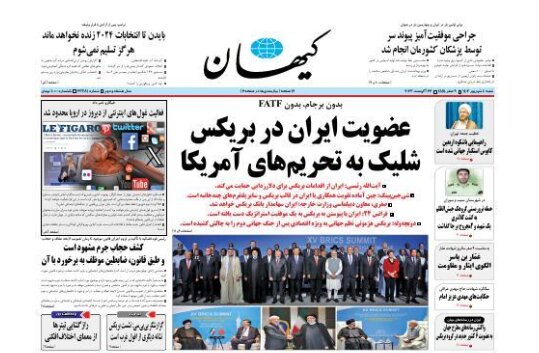
In its Wednesday analysis before Iran and five other countries – Argentina, Egypt, Ethiopia, Saudi Arabia and the UAE – were officially invited on Thursday to join BRICS on January 1, 2024, Kayhan praised support by BRICS leaders for Iran’s membership in the economic bloc that includes economically emerging powers of Brazil, Russia, India, China and South Africa.
It wrote: With the membership of Iran and some other countries in BRICS, this bloc will become more anti-Western and anti-American. 23 countries have already declared to join this alliance. The list shows where BRICS is going by accepting them, as candidates include Iran, Cuba, Belarus and Venezuela. These member states do not hide their distaste of the American "hegemony" and the countries that they consider Western vassals, and they want this alliance to emerge as a "trench against the domination of the West".
Deutsche Welle, affiliated with the German government, wrote: "The three-day meeting of the leaders of the five BRICS countries began in Johannesburg, South Africa, with the presence of dozens of other leaders. BRICS was once formed as an economic alliance in opposition to the Western Group of Seven. Currently, Iran, Cuba, Belarus and Venezuela are candidates for membership. Today, BRICS has taken on a political character and some countries have problems with its enlargement."
Shargh: Fear of Iran-Saudi front
One of Biden's goals to bring Saudi Arabia closer to Israel is to curb Iran's power and rising influence in the region. Israel also considers Iran a big obstacle to its expansionist policies. Therefore, it considers the agreement with Saudi Arabia to be a way to restrain Iran. According to observers, Israel's fear of the new China-Iran-Saudi Arabia front, which can also include Iraq, is increasing. If this alliance is completed with the addition of Iraq and Egypt, it can make Israel's efforts ineffective to strengthen a regional coalition against Iran. The evidence shows that Riyadh has a strong incentive to cooperate more closely with Iran, and probably in the current situation it has prioritized maintaining and expanding relations with Tehran over normalizing relations with Israel. Therefore, any escalation of tension between Iran and the United States or Israel can lead to tension between Tehran and Riyadh, an event that is not in line with Bin Salman's ambitious plans. The evidence shows that the obstacles facing the process of normalizing Saudi-Israeli relations are more complicated than can be imagined or realized in the near future.
Siasat-e-Rooz: The big step of global diplomacy
In its editorial, Siasat-e-Rooz addressed the BRICS meeting in South Africa and said: One of the notable points in the West's processes regarding the BRICS meeting is the emphasis on Iran's role and position in realizing the BRICS goals against the global dominance of the West. In other words, these confessions show the realization of the diplomatic goals of the 13th government, in such a way that today the Western media have no choice but to admit Iran's capacities and global role, including realizing the goals of a bloc as large as BRICS. The important point in this context is the role and position that Iran can play in modern global multilateralism as a stable model against the unilateralism of the West. Therefore, the importance and effective and comprehensive role of Iran in global multilateralism has been welcomed by everyone. The West, which once claimed to use sanctions to surrender and isolate Iran, today not only has not achieved it, but the world is witnessing the decline of the West's unilateralism and the global approach to confront it.
Vatan-e-Emrooz: Panic before shooting
In a note, Vatan-e-Emrooz discussed the Zionists' reaction to the unveiling of the "Mohajer 10" drone. The paper said: Iran's unveiling of this drone led to the reaction of the Zionist media; reactions that mainly show the fear and concern of the Zionists regarding the combat features of Mohajer 10 that are considered a big challenge for the Zionist regime. Yaron Schneider, an Israeli journalist, told Channel 12 TV that the Iranians want to announce that they are ready to respond to any attack, including Israel's threats against their country. Referring to the fact that Iran marked its Defense Industry Day by unveiling a new drone, which is the latest achievement of the Ministry of Defense of Iran, the Jerusalem Post wrote Mahajer 10 has a range of 2,000 kilometers and the ability to fly for 24 hours in a height of 7 thousand meters. This means that Iran can use this drone to threaten Israel or American forces in the region. By increasing the range and type of its drones, Iran has become a major player in the market of these birds.
Source: Tehran Times